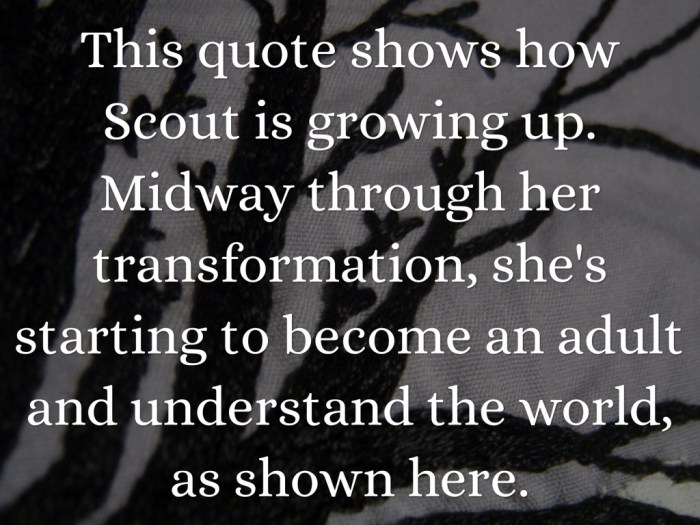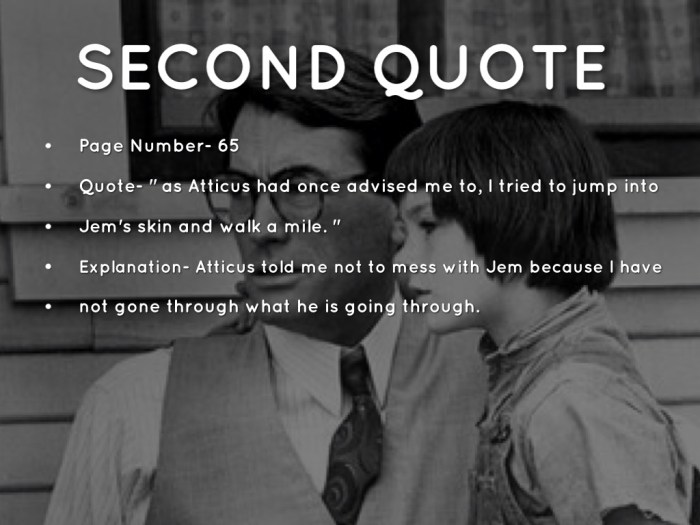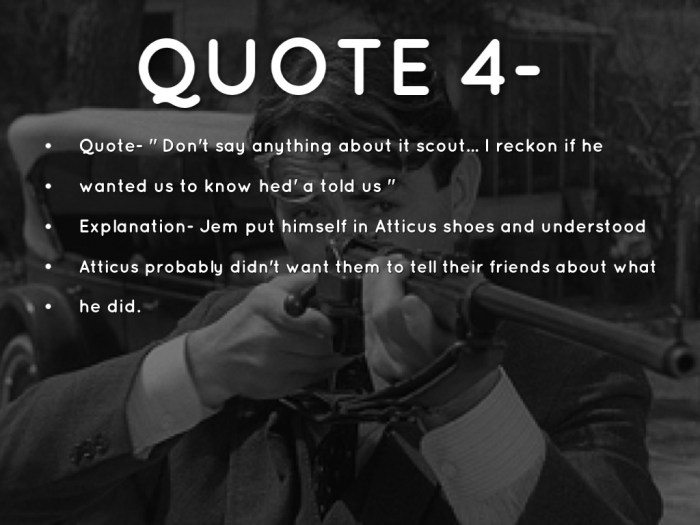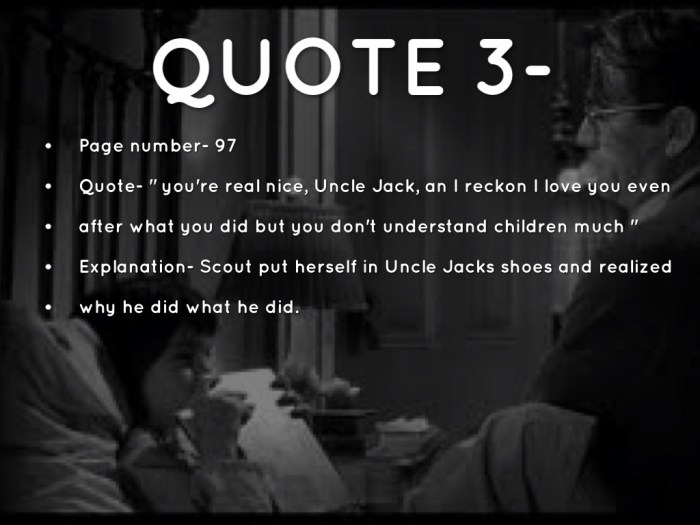Quotes from tkam about scout – Quotes from To Kill a Mockingbird about Scout provide a profound and insightful perspective on the character’s growth, maturity, and unique worldview. These quotes, spoken by Scout herself or others about her, offer a glimpse into the complexities of her character and the profound impact she has on the story.
Scout’s journey from a tomboyish child to a compassionate and understanding young woman is beautifully captured through her interactions with the world around her. Her unwavering belief in justice, her empathy for others, and her resilience in the face of adversity make her a truly unforgettable character.
Scout’s Perspective on Race

Scout Finch, the protagonist of Harper Lee’s “To Kill a Mockingbird,” is a complex and evolving character whose perspective on race undergoes significant changes throughout the novel.
One of the most famous quotes from Harper Lee’s To Kill a Mockingbird is when Scout says, “You never really understand a person until you consider things from his point of view… Until you climb into his skin and walk around in it.”
This quote can be applied to many situations, including understanding the density of dish soap in g ml. Here , you can find a detailed explanation of how to calculate the density of dish soap. By understanding the science behind dish soap, we can better appreciate the words of wisdom from Scout.
Scout’s Interactions with African American Characters
From a young age, Scout is exposed to the racial prejudice that permeates her community. She interacts with African American characters, including Calpurnia, the family’s cook, and Tom Robinson, the accused black man defended by her father.
Initially, Scout’s understanding of race is shaped by the racist attitudes of the adults around her. However, as she grows older and witnesses firsthand the injustices faced by African Americans, her views begin to change.
Evolution of Scout’s Understanding of Race
Scout’s interactions with Calpurnia and Tom Robinson play a pivotal role in her evolving understanding of race. Calpurnia’s wisdom and kindness challenge Scout’s preconceived notions, while Tom Robinson’s trial forces her to confront the harsh realities of racial discrimination.
Through these experiences, Scout comes to recognize the humanity and dignity of all people, regardless of their race. She learns to question the prejudices she has been taught and to stand up for what is right, even when it is unpopular.
Significance of Scout’s Relationship with Walter Cunningham
Scout’s relationship with Walter Cunningham, a poor white boy, is another important factor in her developing understanding of race. Despite their different backgrounds, Scout and Walter share a bond of friendship and mutual respect.
This relationship demonstrates that race is not the only factor that divides people. It shows that people from different backgrounds can find common ground and that friendship can transcend social boundaries.
Scout’s Relationship with Atticus

Scout Finch, the protagonist of Harper Lee’s To Kill a Mockingbird, shares a unique and profound bond with her father, Atticus. Atticus’s unwavering integrity and courage deeply inspire Scout, shaping her moral compass and her understanding of the world.
Atticus’s Influence on Scout’s Development
Atticus’s parenting style fosters Scout’s independence, critical thinking, and empathy. He treats her as an equal, engaging in thoughtful discussions and encouraging her to question societal norms. Through his example, Scout learns the importance of standing up for what is right, even when it is unpopular.
Challenges Scout Faces as a Girl
Despite Atticus’s progressive views, Scout faces challenges as a girl in the male-dominated society of Maycomb. She is often underestimated and dismissed because of her gender. However, Scout’s determination and resilience allow her to overcome these obstacles and prove herself as a capable and intelligent individual.
Scout’s Growth and Maturity

Scout Finch undergoes a significant transformation throughout To Kill a Mockingbird, evolving from a tomboyish child into a compassionate and understanding young woman. Her journey is marked by experiences with prejudice and injustice, which shape her character and ultimately lead to her transformation into “Scout Finch, a lady.”
Scout’s Experiences with Prejudice and Injustice
Scout’s experiences with prejudice and injustice begin at a young age. She witnesses the unfair treatment of Boo Radley, a recluse who is feared by the community due to rumors and misconceptions. Scout’s father, Atticus, defends Boo in court, which exposes Scout to the realities of racism and prejudice in the American South.
Scout also witnesses the trial of Tom Robinson, a black man falsely accused of raping a white woman. Through this experience, she learns about the systemic racism and injustice that exists in her society. These experiences challenge Scout’s childhood innocence and force her to confront the harsh realities of the world.
Scout’s Transformation into “Scout Finch, a Lady”
As Scout matures, she begins to understand the importance of empathy and compassion. She learns to see the world from different perspectives and to challenge the prejudices and assumptions that she has been taught. This transformation is symbolized by her decision to wear a dress and attend a missionary circle meeting, an event that she had previously resisted.
By the end of the novel, Scout has become a young woman who is wise beyond her years. She has learned to stand up for what is right, even when it is difficult. She has also learned the importance of understanding and empathy, and she has a deep compassion for all people, regardless of their race or background.
Scout’s Role as a Narrator: Quotes From Tkam About Scout

Scout Finch’s unique perspective as a young child shapes the tone and themes of To Kill a Mockingbird. Her innocent and observant nature allows readers to experience the events of the novel through the eyes of a child, providing a fresh and often humorous perspective on the complex issues of race, justice, and morality.
Advantages of Using a Child Narrator
- Objectivity:Scout’s childlike innocence allows her to observe events without preconceived notions or biases, offering a more objective viewpoint.
- Emotional Impact:Scout’s youthful vulnerability makes her emotions and experiences relatable to readers, creating a strong emotional connection.
- Naivety:Scout’s limited understanding of the adult world highlights the hypocrisy and injustice of her society, exposing its flaws in a subtle and poignant way.
Limitations of Using a Child Narrator
- Limited Perspective:Scout’s age and experience limit her understanding of complex issues, potentially leading to oversimplifications or misunderstandings.
- Unreliable Narrator:Scout’s youthful imagination and tendency to exaggerate may affect the accuracy of her observations, raising questions about her reliability as a narrator.
- Retrospective Narration:As an adult looking back on her childhood, Scout’s perspective may be influenced by her subsequent experiences and biases.
Scout’s Reliability as a Narrator
Despite her limitations, Scout’s overall reliability as a narrator is supported by her keen observation skills, her honesty, and her ability to convey the emotional truth of her experiences. While her understanding may be limited, her ability to capture the essence of events and characters makes her a valuable and engaging narrator.
Scout’s Influence on Other Characters

Scout’s presence and actions have a profound impact on the other characters in the novel. Her unique perspective and unwavering sense of justice challenge the established social norms and inspire others to reconsider their own beliefs and behaviors.
Scout’s Empathy and Compassion, Quotes from tkam about scout
Scout’s empathy and compassion enable her to connect with people from all walks of life, regardless of their race or social status. Her ability to understand and relate to others helps to bridge divides and promote understanding. For instance, her friendship with Walter Cunningham Jr.
demonstrates her willingness to look beyond superficial differences and see the inherent worth in all individuals.
General Inquiries
What is Scout’s most famous quote?
“You never really understand a person until you consider things from his point of view… Until you climb into his skin and walk around in it.”
How does Scout’s perspective as a child narrator affect the story?
Scout’s childlike innocence and curiosity provide a unique and often humorous perspective on the events of the story, allowing readers to see the world through the eyes of a child.
